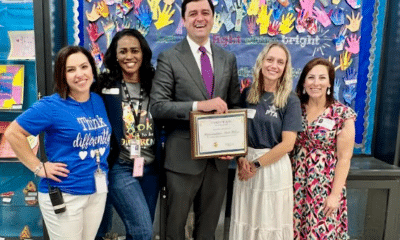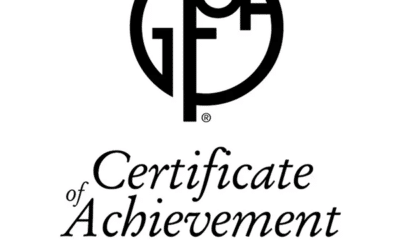Business
Capitalist Sage: Building a Brick n Mortar Retail Business Based on Healthy Living [Podcast]
Published
5 years agoon
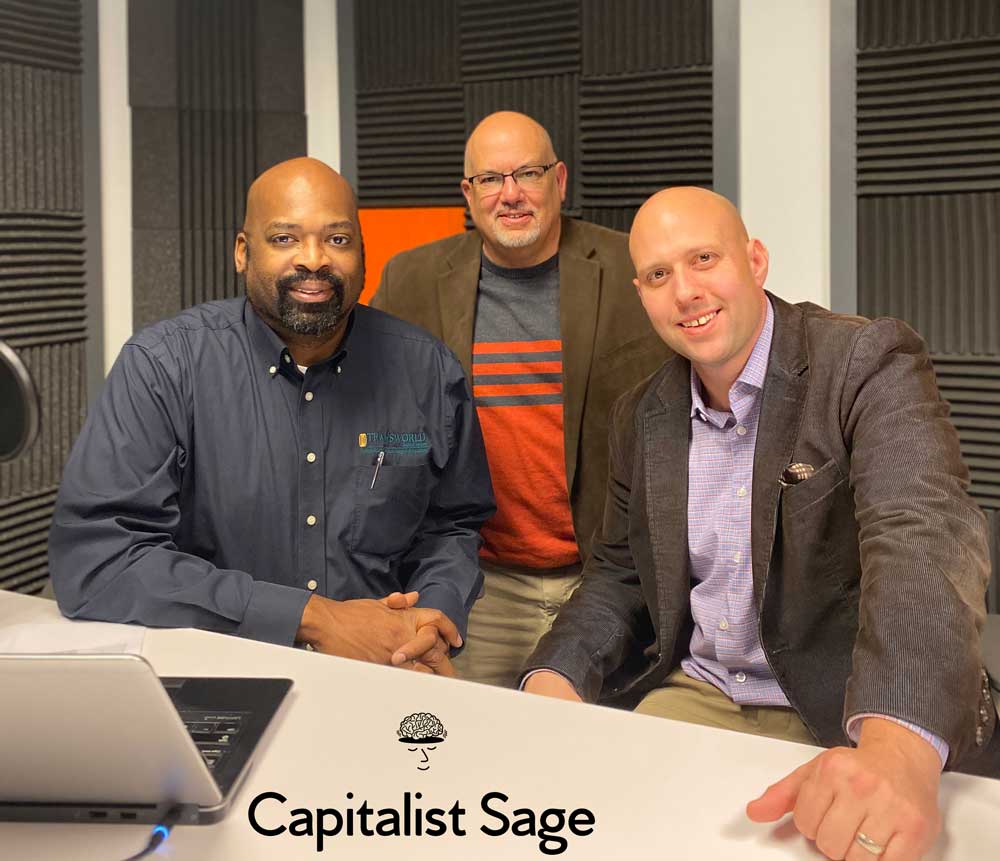
You may not think much of eating your fruits and vegetables, but Matt Scott, CEO of Press, Blend, Squeeze and our guest on this episode of the Capitalist Sage has something to say about eating healthy. After prolonging his father’s life through diet and nutrition, he went on to open up his health food business to keep his community healthy too. Join Karl, Rico, and Matt
as they discuss just exactly how he has worked his way into the health food business.
Social Media:
http://instagram.com/pressblendsqueeze
https://twitter.com/PBSjuice
Website: https://www.pressblendsqueeze.com/
Email: Info@PressBlendSqueeze.com
“As much as people know or don’t know you could really change the way that you feel, not only physically, emotionally. And so we changed his diet and instead of the five month diagnosis we had him for over five years through food. So literally from that, I felt a calling to put together a strategic business plan on how can we change and save lives through food. So that’s literally our mission at Press, Blend, Squeeze, that’s to save lives through food.”
Matthew Scott
Podcast Transcript:
Karl: [00:00:30] Welcome to the Capitalist Sage Podcast. We’re here to bring you advice and tips from seasoned pros and experts to help you improve your business. I’m Karl Barham with Transworld Business Advisors, and my cohost is Rico Figliolini with Mighty Rockets Digital Marketing, and the publisher of the Peachtree Corners Magazine. Hey Rico, how’re you doing today?
Rico: [00:00:48] Good. Good.
Karl: [00:00:49] Any sponsors today for the podcast?
Rico: [00:00:53] Well, Atlanta Tech Park is a major sponsor. We’re in their podcast studio, so Atlanta Tech Park here in the city of Peachtree Corners in Tech Park. It’s an accelerator just down the block from and right on the road of Curiosity Lab at Peachtree Corners. So this is one and a half mile autonomous vehicle track. For those that don’t know, it’s the only one of its kind in the Southeast and to some degree, the only open live living at lab, if you will, in North America or other States in the United States. So lots of things going on, and I’m looking forward to doing this episode.
Karl: [00:01:30] Absolutely. One of the other nice things is it is powered by 5g, Sprint’s 5g system here, so that if you have a company that wants to be on that higher speed internet mobility, internet system, you can work out of Atlanta at their park or others. Do test here. Run that. So just a great hub of technology right here in Peachtree Corners. Today we’d like to introduce our guest Matthew Scott, founder and CEO of Press, Blend, Squeeze Cafe and Juice Bar. I guess it’s a, it’s a local juice cafe, juice bar that opened up in the forum. There’s a couple of them here in the Metro Atlanta area, and we’re going to talk about starting and building a retail business focused on the healthy food movement. We know that everyone has been trying to get healthy and we see folks trying different types of diets, trying different types of alternative to the traditional fast food. And we found really interesting your approach and taking a look at this market and being an entrepreneur and trying to build one. So we want to talk a little bit about your journey in doing that. Matt, why don’t you tell us a little bit about yourself?
Matt: [00:02:50] No, absolutely. And guys, thanks very much for having me. I really appreciate it. You know, before two years ago, I was not in this business. So I was in corporate America for about 15 years, both from significant leadership roles in fortune 500 companies down to startup companies and taking them public all in high growth areas. And I saw an opportunity here and you know, it’s kinda like how most people get brought to changing their diets. It’s when you get punched in the face. And so myself, my dad looked at me and he was given five months to live. From the doctor told me that he had stage four esophageal cancer. And he was my best friend. And I’m sure like I did, like the rest of us would do and say, well, what can we do about that? What, what, you know what, what options do we have? And, you know, so diet is an extremely. Strong portion of influence into everyone’s life. As much as people know or don’t know you could really change the way that you feel, not only physically, emotionally and so we changed his diet and instead of the five month diagnosis we had him for over five years through food. So
literally from that, I felt a calling to put together a strategic business plan on how can we change and save lives through food. So that’s literally our mission at Press, Blend, Squeeze, that’s to save lives through food. And we do that multiple ways and we could get into that a little bit on, on, on that as we go forward. But that’s what we’re trying to do. We had the opportunity, I’m glad that you noted that, It’s just starting out here, down here in Atlanta. We had the opportunity, we were living in Chicago when we started this business, and we could have put this anywhere in the United States that we wanted to put it. Because we moved back to Atlanta to put it here. We saw a significant void in the Atlanta market in comparison to other areas of the country from a quick service, healthy restaurant and juice bar. If you’re driving around Peachtree Corners, there’s not that many options that you’re going to be able to get to. And people thank me each day for opening up and we’re truly seeing the snowball going downhill right now. From people, you know, grabbing on, we actually took over an old juice bar there, but people, it was out and closed for I think almost a year. And so we took it over. And so people are just beginning to realize that we’re back in there and, and they’re very thankful for it.
Karl: [00:05:52] So I can ask the question around you know, your background. Did you have a food background when you started thinking about nutrition background? Tell me a little bit about your background and, and how it helped you, you know, come up with the concept.
Matt: [00:06:07] Yeah, sure. So food background and if you call it this when I was putting myself in high school through college, I had the privilege of going to work for a quick service restaurant. That was the first location of then soon to be broadly franchised restaurant. So I was a hard worker. They brought me in and they allowed me to be one of their lead trainers and opener of new locations. So I got some good experience on how to take a model and replicate it and open it you know in, in a new location and to train the staff. In addition from a food customer service aspect, I worked in restaurants going through college to make Money. So I, I dealt with customers, delivered customer service, was able to take orders attentively and, and give that customer level of customer service in the food industry. But as far as you know being knowledgeable in the space, I was I consider myself a relatively healthy eater. I was always an active in sports physical working out and exercise. And, and so I would eat healthy, but my knowledge increased via doing my due diligence over the web and talking to industry professionals, doctors, nutritionists, et cetera. Once I started looking into it for my dad.
Karl: [00:07:46] So what, what, what most people don’t really understand about the food choices they make and how are you able to, to help modify your dad’s diet. What were some of the changes that you saw really have an impact?
Matt: [00:08:00] Sure. So after my father passed the, I, I was a little bit anxious. I said, doc, you know, my dad was 67. I got two young kids like this, you know, help me out here. And he said, you know, your father’s cancer was not genetic. It was not hereditary. Because there’s three things proven to fight cancer, and that’s eating clean, eating green, and exercise. So, you know, reality is, is that a majority of Americans, I would voucher to say that the majority of people in the world don’t eat enough green vegetables. Green vegetables that basic biology, it has
chlorophyll and photosynthesis, and that’s what gives your cells energy. It also allows your cells to reproduce, gives them the strength to reproduce at a high level. And so cancer feeds on deficient cells. So if you’re in, and this is, this is part of what extent am I, my dad’s life is by having cells that are strong and can defend themselves. Cancer got nowhere to live. I’m sure we’ve all heard stories of people being able to overcome cancer and become cancer free. And some of that’s through killing, you know, radiation and killing all those cancer cells. But that kills all the good with the bad. So if you do some research people have become cancer free through diets. And so greens are that prominent thing.
Karl: [00:09:42] And you know one question along that. Why don’t people eat more green? It’s here, here in the U.S., here in Georgia. What’s, what’s holding us back?
Matt: [00:09:49] Okay. So let’s be real. It is accessibility. It is convenience. Our lives are not going to get any slower. Our lives are not gonna get any less busy. and the food that we have at our disposal. Is a convenience factor. And it’s gotten to the place where the food industry is a business rather than a need. So you know, when we were all, go back 200 years in the United States and we’re farmers and gatherers and everything we ate to survive. Now, people, the food is a business. They’re trying to make it. What do you do in a business? If you’re not going to grow from a volume standpoint, you’re going to try to make it less expensive. And so the majority of food choices at our disposal are from large businesses that are trying to make food cost-effectively.
Karl: [00:10:56] So is this part of the movement that makes like Whole Foods, Sprouts, these types of places? Cause you know, on one hand you see these, these places that are popping up everywhere. So the, there is, for those that they can access it. They’re still not making the choice whether the, you are, you’re in a supermarket, they’re not building diets around fruits and vegetables and increasing the amount of greens in there.
Matt: [00:11:23] Well I would, I would be careful because the fastest growing segment of the supermarket is organic vegetables. If you’re looking at all the areas.
Rico: [00:11:33] I mean, I can see when I go to H Mark, for example, and you go to an Asian supermarket, you will see a big area of vegetables. When you go to a Walmart, only recently have they increased it a little bit and only in those areas where they’re competing with an H Mart or something along those lines. So Americans still are not consuming. You’ll find South Americans use farm communities that are first generation, maybe American. They’re still consuming that. But as they get further away from that generation they’re going back to the processed stuff, they’re going back to the easy stuff.
Karl: [00:12:09] I mean, when you think about it and growing up in New York, how many fruit stands you would go to fresh if you’re in Brooklyn picking avenues. And the city…
Rico: [00:12:23] Tomato, tomato is the big one over there.
Karl: [00:12:23] All of these places that, that had that. And so yeah, accessibility made it easier for people to get fresh, good quality, healthy, healthy food choices. And, and so as part of that, the shifted in parts of the country where, where that tradition wasn’t there and it was more based on supermarkets, they were, where they can control. What people are selecting is, is impacting that.
Matt: [00:12:51] Yeah, I agree. It’s so, it’s accessibility. It’s knowledge. So you know, people say, Oh yeah, I like to eat healthy, but they don’t necessarily know what that means. So like it’s, it’s being able to, to truly understand, you know, even my father, you know, he would even joke to me and be like, Oh, I’m eating an organic banana. And I’m like, well, you don’t have to eat an organic banana. The skin on the banana protects the banana, like so, so like it’s the knowledge of you know how to do it. But it’s also, there is so much of an emotional, psychological, it’s almost reactive because we’re so busy. So all of a sudden instead of it, you know, you being conscious about what you’re eating, your brain goes, Oh, I’m hungry. And. The reality is, is studies show that sugar is eight times more addictive than cocaine. And what you can find is in majority of that quick service food that you have an emotional reaction that says, I’ve waited so long, I’m starving. Now I need to go get something to eat. Let me pull over into this drive through. I’m almost certain than almost any option that you choose there has sugar in it, high fructose corn syrup in it. And, and, and so your body reacts. And there’s, there’s a, an emotional receptiveness that goes off in your brain, that says that.
Rico: [00:14:18] You brought something up that really, and I haven’t seen this, and then it doesn’t make sense to me now that you’re talking about this, is that you have Starbucks, you have Dunkin donuts. The majority of what they sell is true through that drive through. You’ll never see a Starbucks without, without a drive through. But there was one that I remember, there was located somewhere and they asked and they got a rezoning, so then they were able to have a drive through through that one because that was the only way to save that store. And I have yet to see it think a drive through juicing bar. And it doesn’t take long to, to create it. It’s just as long to critical lotta. I think in a, in a Dunkin, not sure. So I haven’t seen that and that we talk about how easy, if that was easy, if I could drive through that, I probably would get that over something else.
Matt: [00:15:06] I’m sure. People ask for it all the time. It’s, it’s absolutely on the radar as far as like convenience. Now what I would say is that it because a lot of times you’re making it to order. It’s not going to be necessarily the speed of others. But you know.
Rico: [00:15:28] I’d wait there for a minute. I mean, it doesn’t take long for, depends on the process.
Matt: [00:15:33] Yeah, no, it’s, it’s absolutely on the radar. We’ve, we’ve discussed it. We’ve looked at locations. We’re not there yet as far as, you know, but it is on the radar. And I’ve had a lot of people bring up the convenience factor. So it goes back to three things. It goes back to
convenience. It goes back to knowledge, and it goes back to emotional, kind of reactions and, and, and addictions to sugar. And, and I even go to people, the, the, the misunderstanding that healthy can’t taste good. So a lot of people kind of coined. I used to have people come into our Dunwoody location and the, the wife and the kids would order something and the husband was there and I said, Hey, you know, can I get you something? He goes, I don’t eat healthy. And I said, well, hold on. Like, what? What, what does that mean? I was like I was like, you don’t like guacamole? No, no. I like guacamole. And I go, well, hold on. Can we get you some, a Turkey wrap with some, some hummus and some roasted peppers and some, you know balsamic glaze on it, man, it sounds really good. And then, you know, I’d say, well how about PB and J smoothie tastes like a peanut butter and jelly sandwich but doesn’t have any sugar in it, but it’s really good. Oh, I like PB and Js. Avocado toast, soup. Like they’re like, Oh man. And then they eat it and then they go, man, this is really good. I go, I guess you eat healthy. Like, so it’s that coined a misconception of it’s true, healthy can taste good.
Rico: [00:17:14] And you also have food though, right?
Matt: [00:17:15] Oh, we do. Yeah.
Rico: [00:17:16] See now that didn’t, and I know that vaguely you have food there, I haven’t been into the store yet. But I would not realize that. I think if I was passing by would think juice point. I wouldn’t think food just that. But you do have a menu though?
Matt: [00:17:30] Absolutely. We do about 50% of our business in food, we do a ton of catering. One of our biggest growth pillars is in corporate catering. You know, when I was in corporate America eating the same, we would cater probably three to four times a week for lunch. And it was kind of from a rotation. And, you know, I’d get a pizza. I could tell you I’m probably going to get pizza. I can tell you, I might get a fried chicken sandwich for breakfast. And you know, I might get Mexican or some type of Southwestern and majority of those after I ate them I was ready for my couch. And corporations are realizing this and, and they’re actually like. You know, some of the large corporations and the reasons why we chose these locations are strategically positioned to align with those corporations. So like Newell Rubbermaid further snack attack on a quarterly basis caters 600 as eyeballs from us IHG regularly for their executives. I’m actually in February, I’m going down and meeting with the CEO’s executive assistant, and she has 14 people that report up to her, that schedule for hundreds of people, but we’re giving them a tasting of our lunch. I mean, so we have these large corporations that are not only providing lunch for their employees, but they’re being more conscious of what they’re providing because it’s actually leading to productivity. Like they, they, you know, they’re, they’re going back and not trying to, you know, relax at their desk.
Karl: [00:19:19] No, I was going to say, I remember doing meetings and corporate training around the world for, for years, and we’d have four or five days of, you know, catered and meals and so on. And we would always, I would actually ask for certain menus on certain days because what happens right after lunch and they come back in and that energy drop.
So we would actually specifically pick activities and exercise right after lunch, which had movement. Kind of wake people up because those heavy lunches, they’d come in with pasta and folks would be ready to go to snooze town and, but, but even having options that gave energy boost you. The afternoon snack break would have muffins and donuts and cakes and cookies. And we started shifting to nuts and try and start a team that shift. But that was my two choices there. There wasn’t a menu of stuff that people could do on that break time. that helps boost that productivity that, that you were mentioning. So, so, so I think that’s, that’s, that’s something that’s seeing, that’s happening in the market.
Rico: [00:20:27] Also, we were talking a little bit before the show before you showed up, and we were talking about how it’s Amazon proof almost. You can’t ship, you can’t ship certain things. You still gotta eat, you still can’t go out that way. But how, how do you find the challenge of doing, you opened a brick and mortar store? You didn’t have to build it, obviously it was built out and you’re there.
Matt: [00:20:49] We build out our last one, our first one. Yeah.
Rico: [00:20:51] So how do you find that? How do you in a world where people are shifting away to Amazon ordering, like I said, over Amazon proof. Or Uber, Ubereats, Dash, Door Dash and stuff like that. How do you find that? How did you find it opening up a place like that? That’s not a franchise essentially.
Karl: [00:21:12] You chose brick and mortar and retail location to deliver this concept. What were you thinking? How do you, how do you, how do you make that decision?
Matt: [00:21:22] So when I experienced the benefits of what we provided, like, and I would encourage anybody that listens to this podcast, I’d encourage you guys go in and grab a juice, go grab a roots and fruits, which is a juice that has some beets in it and has a little bit of orange and ginger. Tell me how you feel in 30 minutes. Dynamically different than anything that you’ve ever eaten or drinking or drank from any other place. So, you know, the reason or how I did that is said, man, this is amazing, you know?
Rico: [00:22:07] But, but how did you find, how did you develop the idea into a business? I mean, how you, you had to open a brick and mortar. What did you fit. You know, buying equipment, the ingredients. How, what’s the actionable side of that?
Karl: [00:22:22] The rest of their business. Often the products, the product and the need is clear and you’re matching those two up, but you’re running a business, right. And it takes, it takes a bunch of things coming together.
Rico: [00:22:33] And this is the second location, right? That you have. So you’re working towards either a chain of them or franchising at some point? How is that working? Doing that?
Matt: [00:22:41] So, so again, I go back to my experience. I was part of a startup. When, when, when we’re, when I was at a startup, we wear many hats. I got recruited actually I should say when I was part of Rubbermaid and my initial job was for a division that started around 30 million. And I got put into at a young age, I’m blessed. And, and believed in by a president and a mentor that gave me significant responsibility to take that 30 million of vision, gave me a significant amount of budget. The ability to strategically put the Strat plan together and grow that business within four years to 150 million globally. I got tapped out of Rubbermaid and recruited out of Rubbermaid to go be part of the largest office products company in the world. And then they brought me in with a pipeline funnel of zero, and they said, we brought you in here because your skillset is different and in the need of nothing that we have internally. And they tap me. And within two years we had a sales funnel of over 150 million in the pipeline. And I had a team of eight, you know, rolling up to me. And so I wrote those trap plans. I built those trap lines. So the way that I did this was I treated this, I said, Hey, there’s an opportunity. Let me, let me develop this business as I would develop any other business. So I went and sourced out partners. I went and did my research on how other competitors were running. I identified machinery that we needed. I put together the menu. I oversaw all the marketing. And I mean, like we, we’ve had wildly success in two years. That, that I like feel so good about, I mean, and blessed honestly, we get like almost 9,000 unique people that have come into our store and given us their telephone number and said, Hey, we are okay with you contacting us, here’s our telephone number. We want to be part of your membership program. Like, I don’t see businesses that are like national brands even, you know, doing that in, in single locations and stuff. So, so we’ve been putting the right strategy around the business to, to have a performance or whether I have experience or not, I treated it like any other business or any other product line and I was about to grow and, and put the…
Rico: [00:25:26] Any challenges that you’d like to share that you’ve overcome?
Matt: [00:25:28] Yeah, I mean, we all got challenges. But I would say, you folks that are entrepreneurs is, be careful of your blind spots. We all have, we all, we all have things that we overlook. You know, one of the biggest hurdles is going from one to two. So as an entrepreneur, you’re at that location. You’re there, you’re, you’re, you’re a part of that location. Yeah, you can’t cut yourself in half. So you know, I would say you know, put the process in place, you know, and just because, you know, the process, operational efficiency and, and that’s something that we had to build out. And, and it’s, you know, a continuous work in progress.
Karl: [00:26:29] So I, I would, I think, I think what you’re describing though is. You know, a theme across big corporations or small business, and it’s the question of scaling. I’m doing it once. It could have been lucky. Right time, right place. Stars align. A thousand reasons why you’re able to achieve success. And sometimes it’s brilliance and hard work. But to replicate it in another location. What are some of the things that would, you know, knowing what you know now, you would, you would advise someone going, thinking of doing, you know, multiple, like what would be things they can put in place that would ease that transition, right? To grow?
Matt: [00:27:13] I probably, we say to people to create a network, right? Because we’re all good at something and we’re all not good at everything. So by having a network of, a sounding board or afforded a trusted board of advisors, it allows you to be stronger in areas that you’re weak. So it allows individuals that might be able to be stronger in certain areas to help you strengthen, sharpen, or have a visible blind spot.
Karl: [00:27:54] I think, I think you’re hitting on something. If you’ve seen many successful people and they talk about this success, there’s usually a network of advisors they have. Even if you look at a large corporation, they’ve got a board of directors, nonprofit governing boards. There are these folks that serve multiple functions. One is to hold a mirror up to you and say, Hey, you know, I know what you’re saying and seeing, but here’s what I’m seeing and here’s things you may not notice. May, may help with the blind spot. They have wisdom and advice to give in the area that you may have the expertise to be able to do that. Third, they can help hold you accountable if you said you were going to do something, if you’re the boss who’s gonna, who’s gonna challenge you, if you decide, ah, we’ll do that next month. But, but, but if you have that advisory group, they, they can be in a position to hold, hold you accountable for them. And the last one is some of the networks that that affords you. they know people that might help you be more successful. And it’s one of the things we often see entrepreneurs struggling with. They eventually build it. We were talking earlier about these groups that do that. But they may have got 15 years of pain in before they realize, man, if I only knew someone that knew about payroll and what can happen if I mess that up.
Rico: [00:29:15] It’s like anything else in life. If you’re a writer or you’re a sports person. Everyone thinks you’re an overnight success, but it took you those years of pain to be able to get there. And most people don’t want that. They want to be able to see success. And maybe you get that advice from that successful person or that team of people to help you get there.
Karl: [00:29:35] Absolutely.
Matt: [00:29:35] Yeah. I’ve been, I’ve been really fortunate and blessed for the people in that have come into my life and, and you know what? A lot of times people have the desire to help people, you know? Sometimes you just have to ask for it. Other times you just, you have to go look for it. But, but people want to help people. And, and so you know, entrepreneurs often like to think they have to do everything themselves. And, and that’s something that an additional piece of advice I would give to entrepreneurs is, you’re no good to anyone if you’re burnt out. So give yourself some space and give your team some trust.
Karl: [00:30:24] No, I agree. I said, the one thing you can’t manufacture and create more is time. And so there’s only so much time that an individual has, and as you grow a business, it actually requires more time very often. And if you don’t build a team to support, it supports you to be able to do that. It makes that a, a challenge. So tell me a little bit about what you got going on next. What’s next for the company and for you?
Matt: [00:30:50] So for a, happy new year to you guys, 2020, it’s going to be a great year. We are gangbusters into new year’s cleanse programs. So it is the best way to reset your palate, control your addiction to sugar, get you jump started into your nutritional needs. It’s amazing the results that we see. We’ve been doing this for over two years. People come back re-energized, they sleep better, their skin’s better. And this is in three days. They, last time I did a cleanse, I lost eight pounds. I hear that over and over again. But you’re refreshed, you’re rejuvenated, and then crazy enough you might think, Oh yeah, I’m you know, after three days I’ll be ready to eat a cheeseburger. You know what? You’re not like, you’re ready to go down the road of, you know having that healthy palate, that healthy diet, and it’s, it’s crazy what it does for you. So that’s, that’s number one. Number two, I would ask any business within this kind of Metro Atlanta area to give us a chance at catering. Everybody has a need one time or another, probably in the next couple of weeks. I’m sure every single business has one lunch that they’re going to be looking to serve to multiple people. Give us a chance, put us in there. And, and, and I think you’re going to love it. I think you’re gonna enjoy it. And I want to be talking to you about your second order. So give us a catering opportunity because it’s a, it’s, it’s totally an awesome experience. And we got resoundingly reviews and feedback from it. So we’d love to work with people.
Karl: [00:32:34] Awesome. I’m glad. Well, located in the Forum your first location is where…
Matt: [00:32:41] It’s in Dunwoody Village. So where the Fresh Market is, or if you know where Village Burger is, or if you know where the post office is down there, so it’s in Dunwoody village, which is getting rejuvenated as well. So that’s kind of exciting.
Karl: [00:32:55] How can folks reach, you learn more online. social media.
Matt: [00:32:59] So we got thousands of followers on Instagram and which is @PressBlendSqueeze. The location here has Press, Blend, Squeeze at Peachtree Corners. Facebook Press, Blend Squeeze. If anybody wants to shoot me an email, if they have questions about a cleanse Info@PressBlendSqueeze.com comes directly to me. I see them all. I’d love to do a group cleanse. We’re doing it with a lot of gyms. So we had, last week, we had like 70 days of cleanses go out. And, and so this next week we’re partnering with another gym here in this area. And, and we have a couple more on the radars. So it’s, it’s time. Do it for yourself. Do it for your family. Do it for your energy, but do it to feel better. So it’s, it’s pretty cool.
Karl: [00:33:56] Well, I want to thank you very much for being our guest today. Our guest, Matt Scott, CEO of Press, Blend, Squeeze, for your time today and sharing part of your journey and, and inspiring others that may be thinking about making a change in their career and their life. And finding ways to do it in a way that’s aligned to something that you’re passionate about. Being healthy and how to, how to solve this problem where folks can’t find it as convenient to get nutritional greens into their, into their bodies that they can. So we really appreciate your joining us for that. We also wanna thank Atlanta Tech Park for hosting us every time we have one of our episodes here to Capitalist Sage Podcast. If you’re starting a business and looking
for a great environment to come and work and be around people that are going on this entrepreneurial journey along the way with you, it’s a great way to build network. Entrepreneurs sometimes can be a very lonely endeavor. So having other founders and makers and, and business leaders to collaborate with is, is really, is really powerful. I’m Karl Barham with Transworld Business Advisors of Atlanta Peachtree. Our business advisors are available to consult on your business, whether you’re looking to improve or grow the business, or you’re looking to exit or start a business. You can contact any one of our agents to be able to help you with that are available at www.TransworldBusinessAdvisors.com/AtlantaPeachtree. And Rico, why don’t you tell us a little bit about what you’ve got going on and going to the next couple of weeks.
Rico: [00:35:32] Sure, so I run Mighty Rockets. We’re a social media online company. We provide content branding and whether it’s on LinkedIn or Instagram and soon to be Tick-Tock, cause there is a market out there and believe it or not, in the United States, it’s like 24 million users and tick tock and 40% of them are between 18 and 24. So that age. Voter age, if they felt maybe so, I do that. That’s MightyRockets.com. But I also published Peachtree Corners Magazine and you could find, you could go to LivingInPeachtreeCorners.com and find our website. We talked about what’s going on in the city. We’re doing several podcasts upcoming in with Peter Coin, his life with some interesting guests. Also Prime Lunchtime with the City Manager is coming up Thursday. After the fourth Tuesday, we’ll be discussing what’s going on in the city of this month and let’s what the city is planning over the next few months. A lot of new stuff happening out there and we’re working on the next issue of Peachtree Corners Magazine and the cover story, I believe that comes the story we’re working on right now, and it should be, the cover is innovative and innovative companies and organizations in Peachtree Corners. I will be doing some podcasts as well for that to complement that. So this is just a lot of stuff going on. So if you’re looking for any either trends to reach the audience here on Peachtree Corners through the family podcast, or you need someone to work with you online or branding, that’s what I do.
Karl: [00:37:03] Oh, fabulous. Well, you know, I really look forward to the next edition of the magazine and folks, if you go around and take a look and read through it, just knowing what’s going on here in the local community, whether it’s business, whether it’s what’s happening in the political team, what’s happening with, with, with various organizations. It’s just a good way to keep up with events and activities and in the area. So one of the thank you for that. That’s all we have for today. Look forward to talking to you some more and having some more great guests like Matt Scott that came to visit us today. Thank you everyone.
Related

Business
Peachtree Corners Grows Business Opportunities Through Economic Development
Published
6 days agoon
May 6, 2025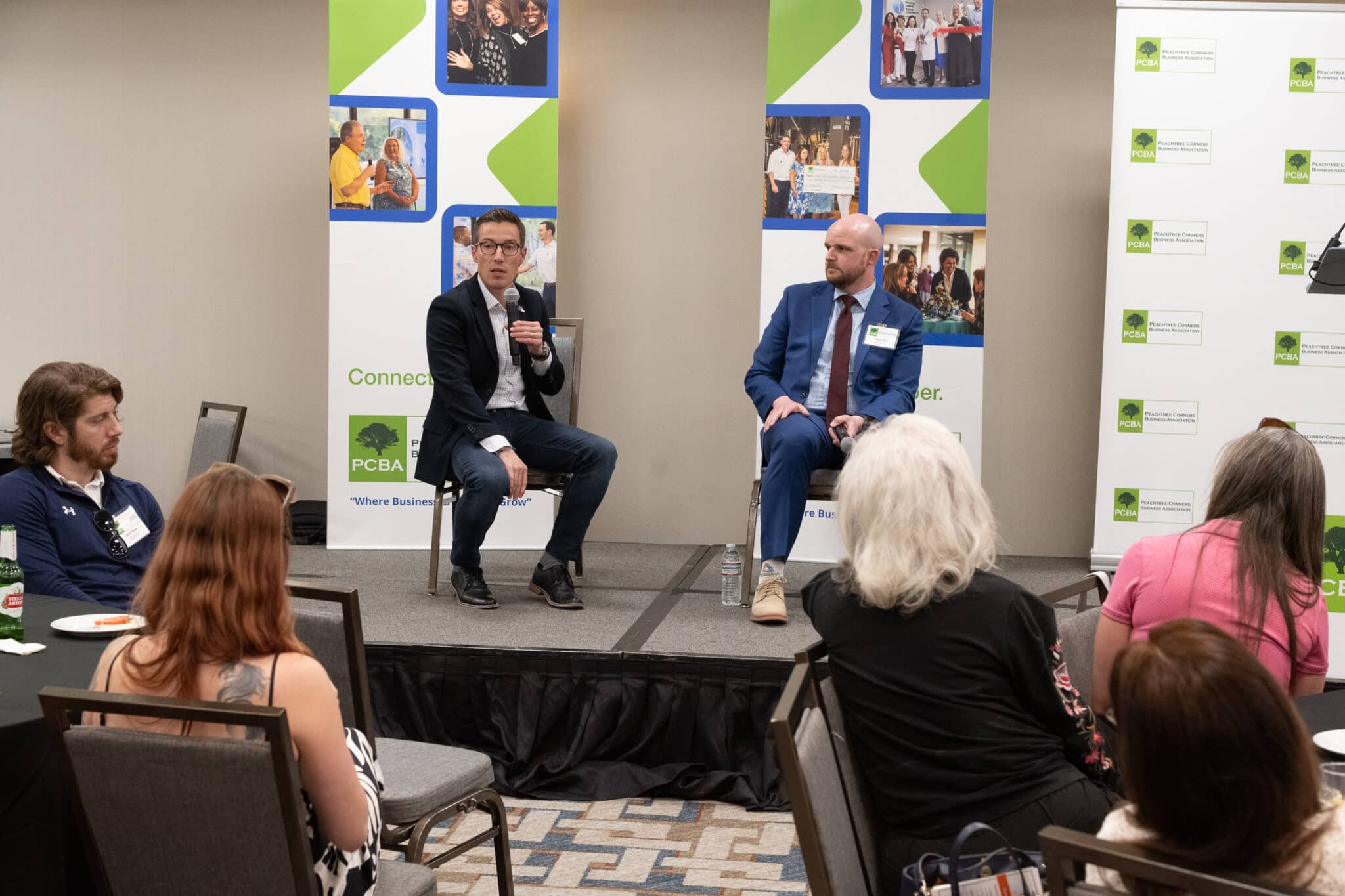
Most residents and business owners in Peachtree Corners probably think they know all about the economic development and strategic planning of Peachtree Corners, but do they really?
Peachtree Corners Business Association invited Peachtree Corners Economic Development Director Betrand Lapoire and Partnership Gwinnett Director of Economic Development Andrew Hickey to its After Hours Speaker Series on March 27 to discuss the city’s growth from a 1971 master plan to a bustling city with 42,000 inhabitants and 40,000 jobs.
Key points included the importance of business retention and expansion, with 24 projects last year creating 1,600 retained jobs, 1,600 new jobs and $250 million in new capital investment.
The Curiosity Lab, a world-class innovation center, was emphasized as a significant attraction. The city’s zoning and infrastructure plans were also discussed, focusing on balancing office and residential development to maintain a vibrant, sustainable community.
Matching jobs to residents
Although Peachtree Corners is just a teenager in terms of being an incorporated city, the foundation for this vibrant, fast-paced economic hub was laid more than 50 years ago by technology pioneer Paul Duke.
“Peachtree Corners was the first master-planned, business innovation technology park in metro Atlanta,” said Lapoire. “It was in response to the brain drain of technology with Georgia Tech graduates leaving the area.”
While the city may have a small-town feel, it’s the largest in Gwinnett County by population, but not land mass, he added.
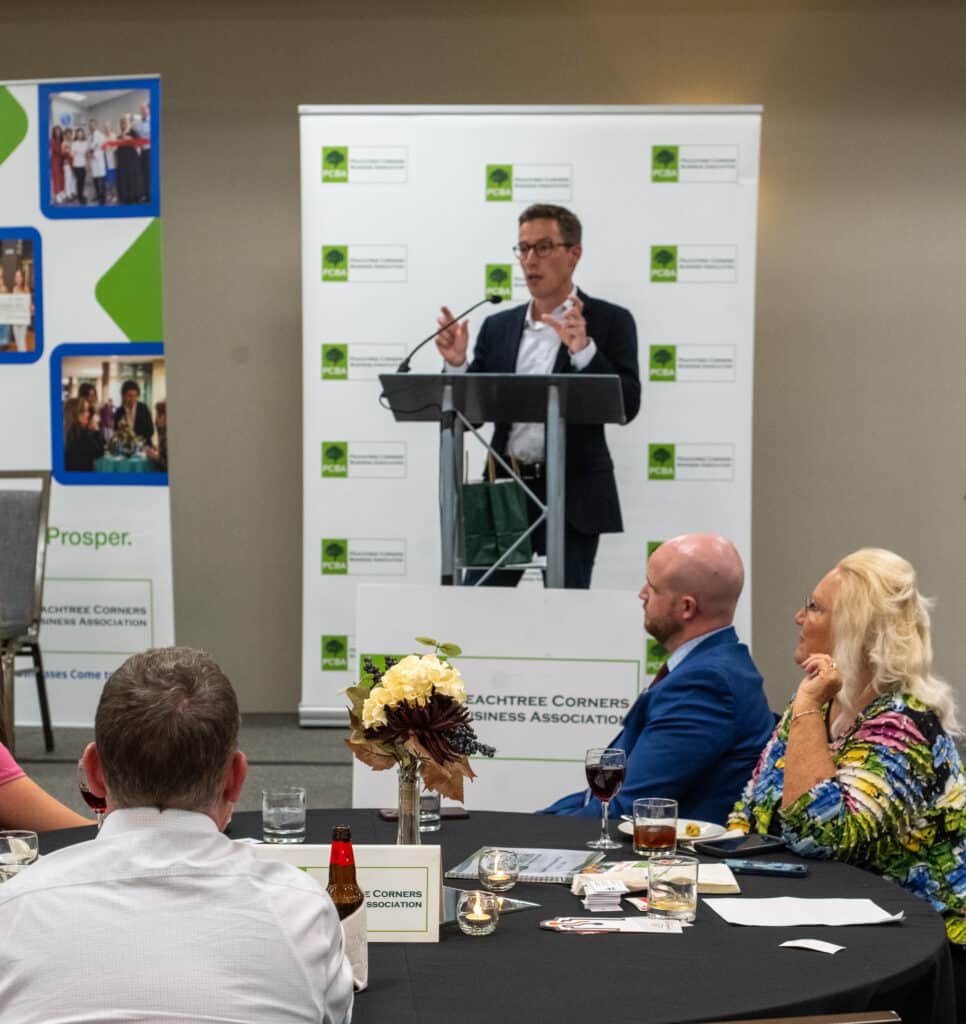
“The city started from a commercial, industrial, R&D base and then was expanded around it,” said Lapoire.
Though home to more than 42,000 residents, most of the jobs in Peachtree Corners are filled by people who live outside the city, he added.
“So we have this interesting mismatch, in a way, although not unusual,” said LaPoire. That creates traffic and transit issues. So that means that one of the solutions is to create more jobs here to fit the profile of the community.”
He presented charts that show professional services, consulting and engineering as the largest job categories. The next tier of businesses are wholesale and manufacturing.
“So we have a good mix of industry,” he said.
A five-year plan
The city has a five-year economic development plan (2023-2028) that outlines strategies for attracting and retaining businesses, with education and workforce development being key components.
Partnership Gwinnett has similar goals as Peachtree Corners, but on a larger scale.
“We are the county’s sales and marketing arm for all 17 cities now, and we receive funding from both municipal sources as well as existing businesses here — both in Gwinnett and outside of Gwinnett as well,” said Hickey.
He shared how Partnership Gwinnett is designed to drive a lot of major corporations toward doing business inside and with Gwinnett County.
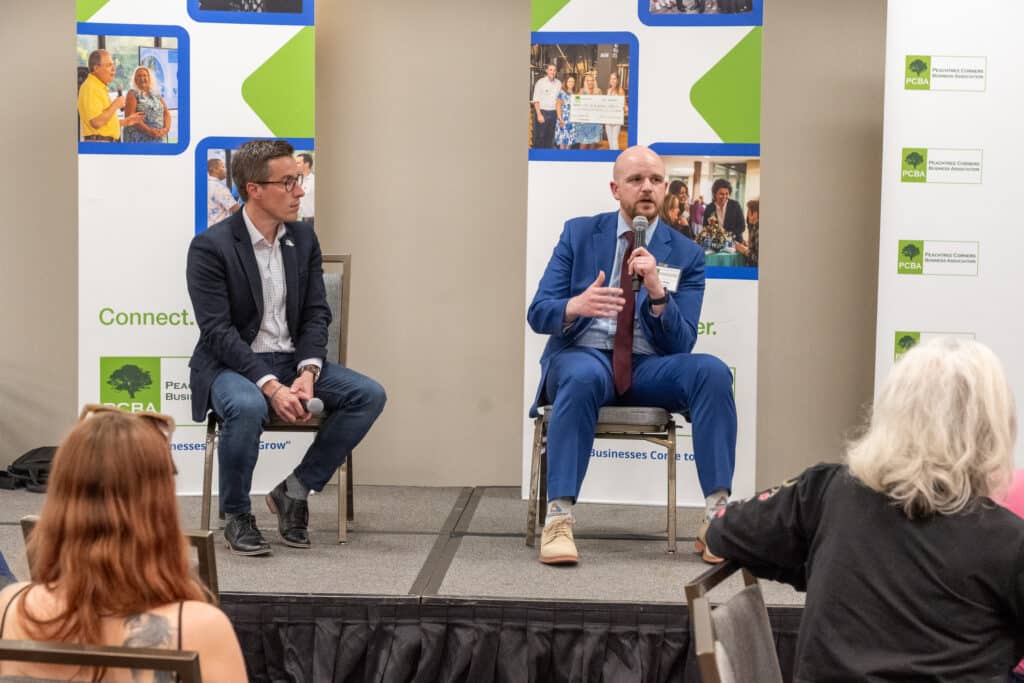
“One of the biggest things that we talk about that I’m sure it seems like most of us here, if you live here, you work here, you understand it. It’s the diversity that exists here in Gwinnett,” he said. “With a diversity index of 85, that means if we walk out of the Hilton here and we say hello to somebody, there’s an 85% chance they’re from a different ethnic or cultural background than ourselves, which to you and I may seem normal because that’s the life that we live in.”
He added that for companies, there’s a tremendous value in that, whether they have stated values, or they’re just making hiring decisions to get a wide range of candidates to fill those roles. Additionally, because of the proximity to Atlanta, Gwinnett County has a great labor draw.
Partnership Gwinnett
Partnership Gwinnett plays a significant role in recruiting businesses, expanding existing companies and developing the workforce. Hickey showed how the organization was involved with more than 24 projects last year.
“A majority of those were expansions, and that is a common thread you’ll see in economic development,” he said. “In business retention, expansion is so vital to working with our existing companies to make sure that they have the resources they need.”
He added that’s what leads to new investment and job creation in the community.
The organization also focuses on redevelopment projects, working with cities and the county to improve infrastructure and community amenities — especially strong educational institutions such Georgia Gwinnett College, Philadelphia College of Osteopathic Medicine and others.
Quality of life
In closing, both men stressed the importance of recruiting companies and developing the workforce, along with one aspect that means a lot but may not be as obvious — quality of life.
“It’s definitely evident that people like to work where they live — the whole live, work play experience,” said Hickey. “I joke that the part that people really have the most questions about, and are most excited to learn about, is new events at The Forum or Gwinnett Place Mall.”
Although they want to know what’s the next major company coming to Gwinnett, people REALLY want to know about how to spend their leisure time.
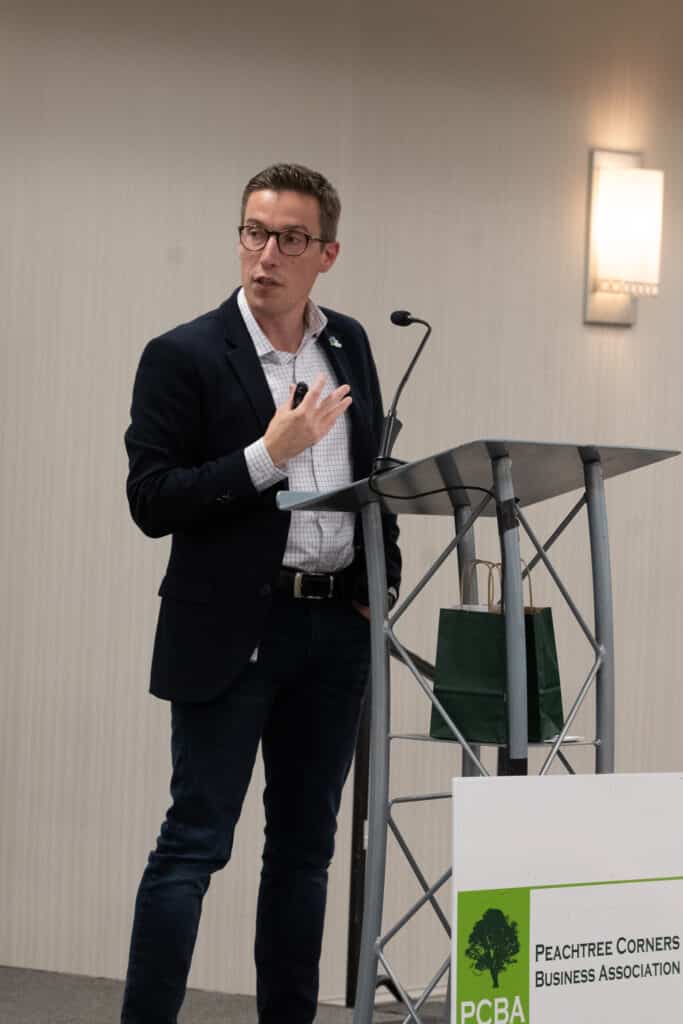
“That speaks to the importance of ensuring that we have a great community,” he said. “So at Partnership Gwinnett we work with all of our cities, and the county government as well, [on] a kind of a best-practices trip.”
He added that the peer tour allows everyone to know what the neighboring communities are doing and share the good news.
“We will take all of these elected officials, but also city staff, to different cities across the Southeast,” he said. “Last year, I believe they went to Huntsville, and have been to Greenville, Chattanooga — all cities that have done some really cool redevelopments that have taken their city to the next level. Our goal is to learn from them.”
Related
Business
Two Peachtree Corners Business Leaders Named Finalists for EY Entrepreneur Award
Published
3 weeks agoon
April 23, 2025
Ernst & Young’s Entrepreneur Of The Year celebrates ambitious entrepreneurs who are shaping the future
Ernst & Young LLP (EY US) recently announced the finalists for the prestigious Entrepreneur Of The Year 2025 Southeast Award, and two local, Peachtree Corners business leaders — David Quirk, president and CEO of DLB Associates Consulting Engineers PC and Erin Hanson, founder and CEO of Guardian Sports — made the list.
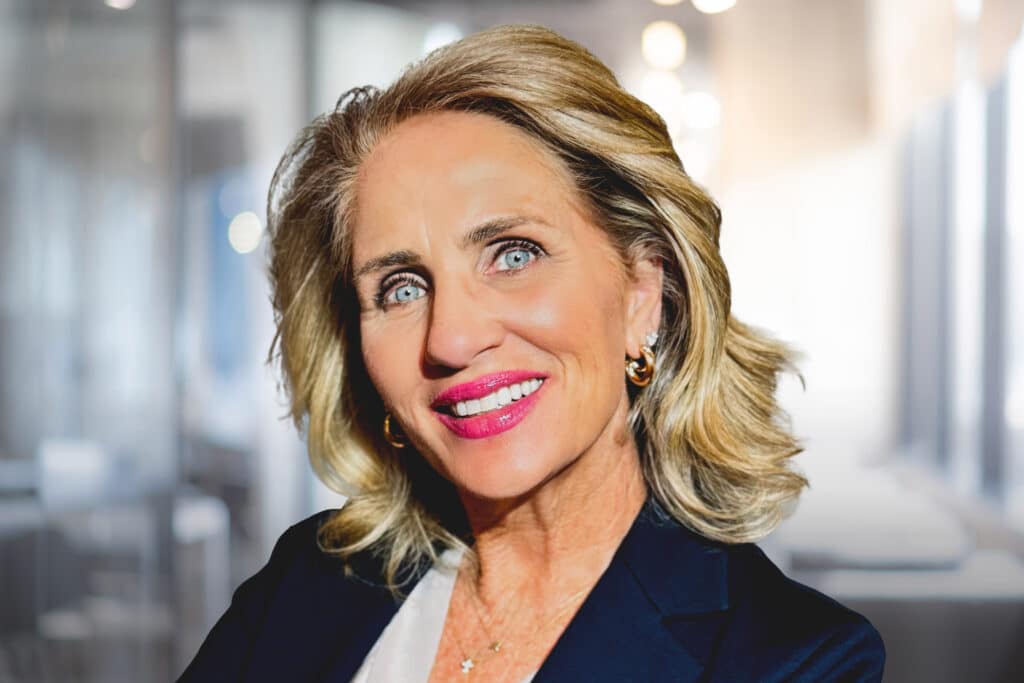
Hanson’s Guardian Sports is a family-owned company dedicated to serving athletes through safety and performance improvements in sports equipment. Major products include the Guardian Cap, PEARL ball and Guardian Infill serving the sports industry.
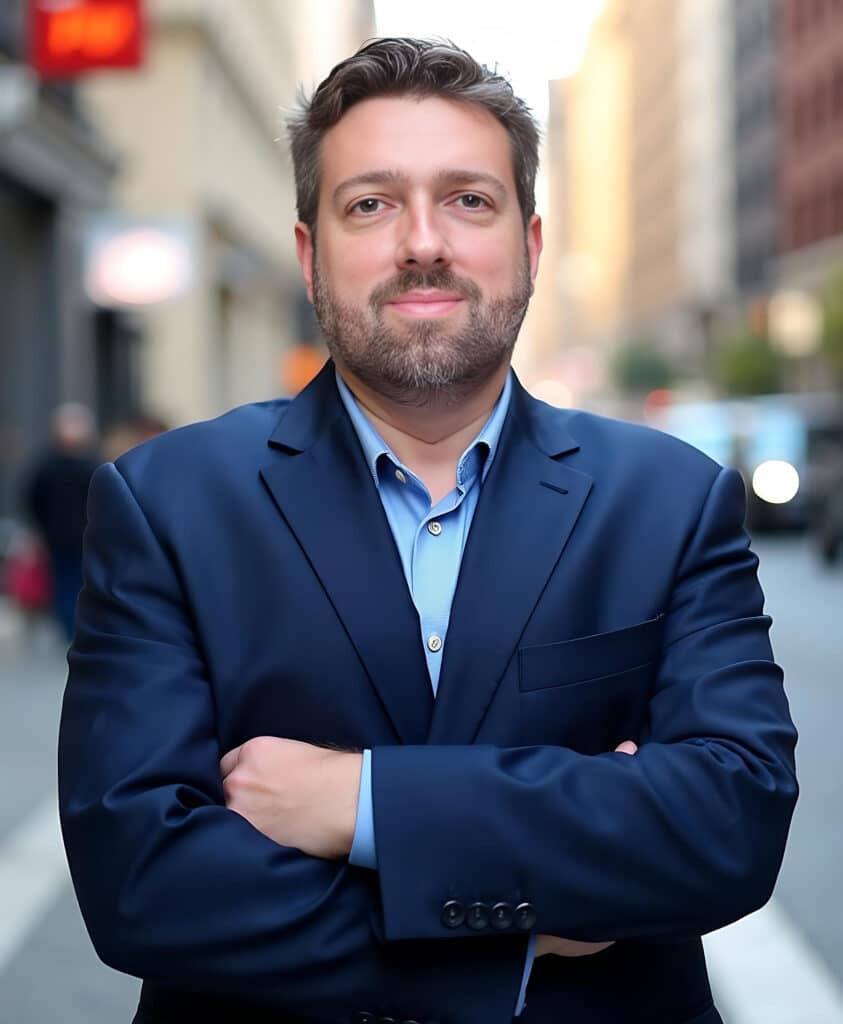
DLB Associates is a U.S.-based consulting engineering firm specializing in mission-critical and complex built environments. With more than 40 years of expertise, DLB delivers innovative, technology-driven solutions in engineering, commissioning and operations worldwide.
Celebrating entrepreneurial leaders
Now in its 40th year, Entrepreneur Of The Year recognizes the bold leaders who disrupt markets through the world’s most ground-breaking companies, revolutionizing industries and making a profound impact on communities. The program honors those entrepreneurs whose innovations shape the future and pave the way for a thriving economy and a hopeful tomorrow.
The Southeast program celebrates entrepreneurs from Alabama, Georgia, North Carolina, South Carolina and Tennessee.
An independent panel of judges selected 36 finalists for their entrepreneurial spirit, purpose, growth and lasting impact in building long-term value.
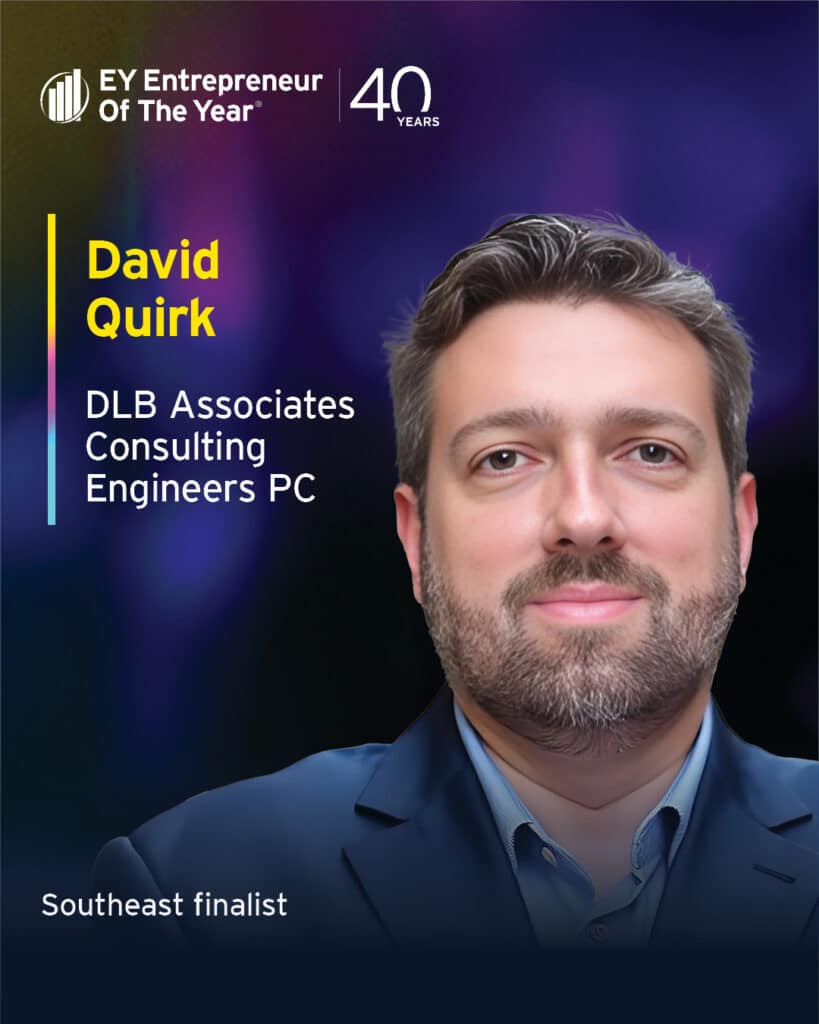

“This year’s finalists are leading examples of innovation, perseverance and resilience, illuminating paths to a brighter future for their industries and communities,” said Chevy Arnold, Entrepreneur Of The Year Southeast Program co-director.
“Their commitment to excellence transforms challenges into opportunities, inspiring us all,” added Kimberly Kicklighter, Entrepreneur Of The Year Southeast Program co-director.
Entrepreneur Of The Year honors many different types of business leaders for their ingenuity, courage and entrepreneurial spirit.
The program showcases original founders who bootstrapped their business from inception or who raised outside capital to grow their company; transformational CEOs who infused innovation into an existing organization to catapult its trajectory; and multigenerational family business leaders who reimagined a legacy business model to strengthen it for the future.
Including Quirk and Hanson, the 2025 Southeast finalists are:
- Marc Hodulich | 29029 | Atlanta, Georgia
- Damon Stafford | Alpine Intel | Charlotte, North Carolina
- Lou Hensley | Aspida | Durham, North Carolina
- Matthew Dent | Buffalo Rock Company | Birmingham, Alabama
- Melanie Little | Colonial Pipeline Company | Alpharetta, Georgia
- Will Bartholomew | D1 Training | Franklin, Tennessee
- Rene Diaz | Diaz Foods | Atlanta, Georgia
- David Quirk | DLB Associates Consulting Engineers PC | Peachtree Corners, Georgia
- Markus Scott | EyeQ Monitoring | Atlanta, Georgia
- Jon Gosier | FilmHedge | Atlanta, Georgia
- John Fitzpatrick | Force Marketing | Atlanta, Georgia
- Dr. Barry Patel | Galt Companies | Atlanta, Georgia
- Dr. Wade Smith | Galt Companies | Atlanta, Georgia
- Charles Gillespie | Gambling.com Group | Charlotte, North Carolina
- Kevin McCrystle | Gambling.com Group | Charlotte, North Carolina
- Mike Griffin | Griffin Brothers Companies | Cornelius, North Carolina
- Erin Hanson | Guardian Sports | Peachtree Corners, Georgia
- Dan Beem | Hissho Sushi | Charlotte, North Carolina
- Aaron Siegel | Home Team BBQ | Charleston, South Carolina
- Marc Murphy | Ignite Digital Services | Charleston, South Carolina
- Miller Chalk | Inglett & Stubbs, LLC | Mableton, Georgia
- Liza Rodewald | Instant Teams | Southern Pines, North Carolina
- Stephen Andresen | McClancy Foods & Flavors | Fort Mill, South Carolina
- Travis LeFever | Mission Mobile Medical Group | Greensboro, North Carolina
- Cyrus Mojdehi | Northway Homes | Charlotte, North Carolina
- Connor Ryan | NutraSky | Alpharetta, Georgia
- Fritz Owens | OTR Solutions | Roswell, Georgia
- Christopher Chuang | Relay, Inc. | Raleigh, North Carolina
- Kurt Jacobus | restor3d, Inc. | Durham, North Carolina
- Tom Kendrot | Shearwater Health | Nashville, Tennessee
- Teak Shore | Southern Lighting Source | Cumberland, Georgia
- Cindy Eckert | Sprout Pharmaceuticals | Raleigh, North Carolina
- Bryan Moore | TalkShopLive Inc. | Nashville, Tennessee
- Tina Moore | TalkShopLive Inc. | Nashville, Tennessee
- Igor Marinelli | Tractian | Atlanta, Georgia
- Joan Butters | Xsolis | Franklin, Tennessee
You can learn more about the finalists at ey.com/en_us/entrepreneur-of-the-year-us/southeast/winners-finalists.
Regional award winners will be announced on June 25 during a special celebration. The winners will then be considered by the national independent panel of judges for the Entrepreneur Of The Year National Awards, which will be presented in November at the annual Strategic Growth Forum®, one of the nation’s most prestigious gatherings of high-growth, market-leading companies.
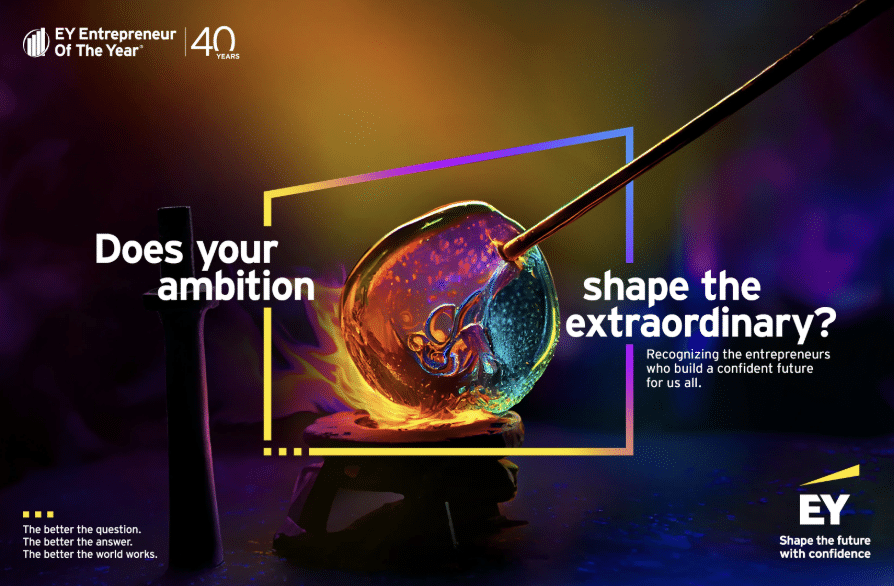
About Entrepreneur Of The Year
Founded in 1986, Entrepreneur Of The Year has celebrated more than 11,000 ambitious visionaries who are leading successful, dynamic businesses in the U.S., and it has since expanded to nearly 60 countries globally.
The U.S. program consists of 17 regional programs whose panels of independent judges select the regional award winners every June. Those winners compete for national recognition at the Strategic Growth Forum® in November where national finalists and award winners are announced.
The overall national winner represents the U.S. at the EY World Entrepreneur Of The Year™ competition.
For more about the award, visit ey.com/us/eoy.
Related
Business
SCB Construction Group Partners with CGA Reps on New Peachtree Corners HQ
Published
4 weeks agoon
April 15, 2025
SCB Construction Group, freshly rebranded from SteelCo, secures construction project with CGA Reps for new office HQ in Peachtree Corners
SCB Construction Group has announced a strategic partnership with CGA Reps to build a new office headquarters in Peachtree Corners. The project, encompassing approximately 26,000 square feet of innovative workspace, marks a significant milestone in advancing CGA Reps’ corporate vision while showcasing SBA Construction Group’s commitment to delivering transformative construction solutions.
In collaboration with Oakley Real Estate Partners — serving as developers of the project on behalf of CGA Reps — this venture reflects a united effort to bring cutting-edge design (from Smallwood architecture firm) and operational excellence to the commercial kitchen equipment industry.
The announcement follows several high-profile projects for SCB Construction Group in 2024, including a 72,500-square-foot manufacturing center and headquarters for Process Equipment & Controls, an impressive interior build-out for Courtesy Ford Conyers’ commercial service center and the Phase 1 completion for StoreEase Loganville — recently honored as a 2024 Smart Facility of the Year by Modern Storage Media.
A bold new chapter for CGA Reps
The new 25,890-square-foot headquarters is designed to be more than just a workplace — it is envisioned as an inspiring environment that serves both client engagements and employee creativity. CGA Reps is recognized as an industry expert in commercial kitchen equipment, representing leading manufacturers, warehousing, distributing and installing everything from fryers to commercial walk-in freezers.
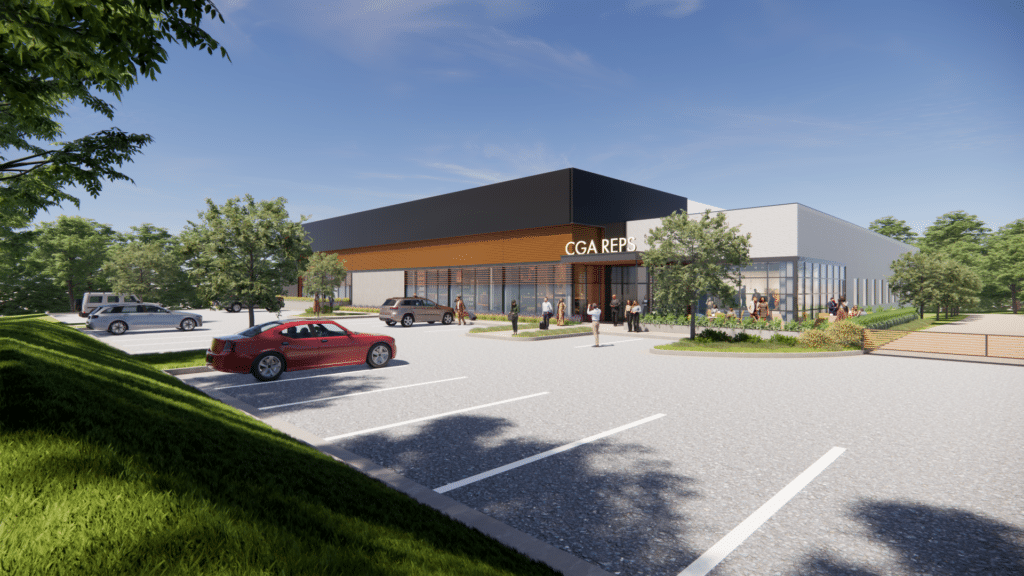
The facility’s design reflects this expertise, featuring a dedicated approximately 9,000-square-foot showroom kitchen that will host equipment demonstrations, tradeshows and webinars. This dynamic space will allow CGA Reps to showcase its comprehensive product range and provide clients with hands-on experiences of the latest commercial kitchen innovations.
A standout feature of the project is its innovative approach to stormwater management. With the site comprising only three acres, sufficient space for a traditional detention pond does not exist. To overcome this challenge, the design includes an underground detention system located beneath the truck court to efficiently handle all stormwater runoff.
This solution not only maximizes the use of the available land but also reinforces CGA Reps’ commitment to sustainable practices.
“We are excited to embark on this project with CGA Reps,” said Jay Bailey, CEO of SCB Construction Group. “This partnership underscores our commitment to customer excellence in design and construction, and it is a testament to the trust our clients place in our ability to deliver projects that not only meet but exceed expectations.”
Delivering excellence through proven expertise
SCB Construction Group’s track record in 2024 has been nothing short of remarkable. Earlier in the year, the company completed a 72,500 square foot manufacturing center for Process Equipment & Controls, integrating office space within a dynamic production facility.
This project was celebrated for its innovative design that balanced operational efficiency with a modern aesthetic, utilizing IMP panels to mimic tilt-up concrete, setting new standards for manufacturing environments.
Similarly, the interior build-out for Courtesy Ford Conyers’ commercial service center demonstrated SCB Construction Group’s ability to transform conventional spaces into functional and attractive environments that cater to both customer and staff needs.
The company’s commitment to quality and precision was again evident in the successful Phase 1 completion for StoreEase Loganville. This project, which recently earned the distinction of a 2024 Smart Facility of the Year by Modern Storage Media, highlights SCB Construction Group’s forward-thinking approach to construction and design, incorporating smart technologies and design that enhance sustainability and operational efficiency.
A rebranding that reflects a vision for the future
In a move that signals its evolution and growth, SCB Construction Group has recently rebranded from its former identity, SteelCo Buildings, as it spins off its construction division. This strategic rebranding is not merely cosmetic — it represents a renewed commitment to capabilities, credibility and client-focused service.
The refreshed brand is anchored by a new tagline “Deep Expertise, High Expectations” and a clear brand promise that communicates the company’s mission: to craft exceptional construction experiences based on precision, innovation and trust.
“Our rebranding is about more than just a new name or logo; it’s a renewed promise to our clients and communities,” explained Robert Lee, marketing director at SCB Construction Group. “We believe that our updated brand identity, including our invigorated tagline and mission statement, encapsulates our dedication to pushing the boundaries of design and construction. It reflects our commitment to creating spaces that are as inspiring as they are functional.”
Transforming spaces to inspire and connect
The new headquarters for CGA Reps is expected to become a landmark facility in Peachtree Corners. Beyond its impressive architectural design and advanced construction techniques, the building is planned as a hub for innovation and collaboration.
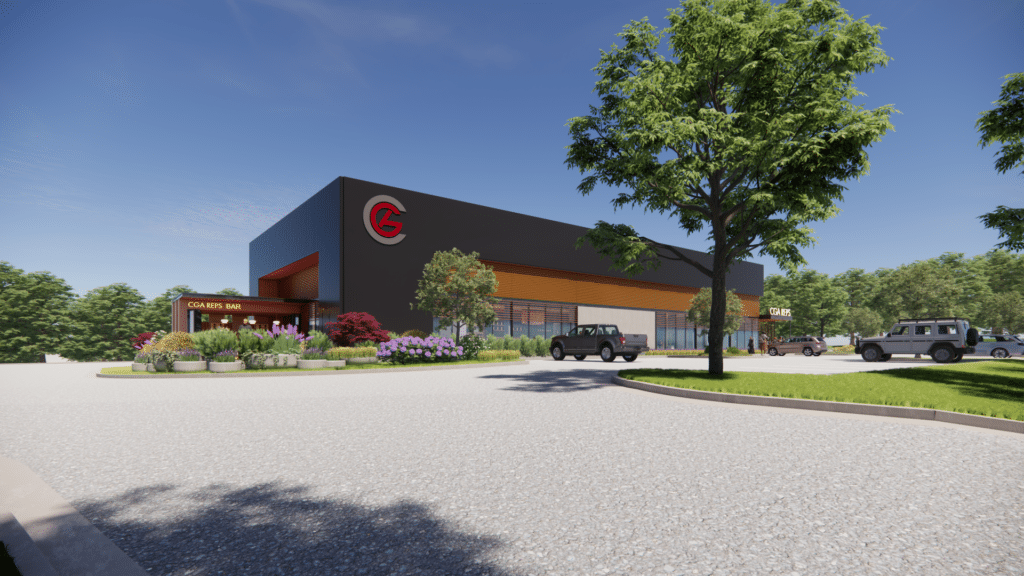
The interior build-out will include dynamic client reception areas, interactive meeting rooms, and dedicated spaces designed to foster creativity and teamwork among employees. The layout is crafted to ensure that every area of the facility contributes to a productive and inspiring work environment.
“By investing in this state-of-the-art facility, CGA Reps is making a strong statement about the future of work,” said Bryan Young, VP of construction at SCB Construction Group. “Our team is dedicated to designing and building spaces that not only serve the immediate needs of our clients but also create environments that motivate and inspire. The new headquarters will be a testament to that vision.”
Looking ahead
The partnership between SCB Construction Group and CGA Reps marks a significant step forward for both companies. As SCB Construction Group continues to build on its legacy of excellence and innovation, this project is poised to set a new benchmark for modern office headquarters design in the region.
With a strategic focus on creating spaces that inspire, connect and drive success, the future looks promising for both SCB Construction Group and its esteemed partner, CGA Reps.
For more information on the new headquarters project or to learn more about SCB Construction Group’s portfolio, visit scbcg.com.
Related
Read the Digital Edition
Subscribe
Keep Up With Peachtree Corners News
Join our mailing list to receive the latest news and updates from our team.
You have Successfully Subscribed!

Katherine Lafourcade — A Journey of Passion, Resilience and Giving Back

Digital Edition

PCBA Announces 2025 Scholarship Winner

Official City Merchandise Line Debuts This Saturday at Town Green

Paul Duke STEM High School Student Earns CGO Scholarship

World Blood Donor Day Starts Here: Theo’s Miracle, Katherine’s Mission [Podcast]

Executive Function: A Tribute to Working Moms

Peachtree Corners Grows Business Opportunities Through Economic Development

City of Peachtree Corners Awarded Certificate of Achievement From GFOA for Seventh Straight Year

Simpson Elementary Marks Exceptional Children’s Week

Executive Function: A Tribute to Working Moms

Official City Merchandise Line Debuts This Saturday at Town Green

Peachtree Corners Grows Business Opportunities Through Economic Development

Digital Edition

World Blood Donor Day Starts Here: Theo’s Miracle, Katherine’s Mission [Podcast]

Paul Duke STEM High School Student Earns CGO Scholarship

Light up the Corners [Video]

Capitalist Sage: Business Leadership in Your Community [Podcast]

Cliff Bramble: A Culinary Adventure through Italy

Top 10 Brunch Places in Gwinnett County

A Hunger for Hospitality

THE CORNERS EPISODE 3 – BLAXICAN PART 1

Top 10 Indoor Things To Do This Winter

The ED Hour: What it takes to Remove Barriers from Education





